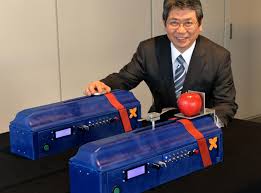Japanese researcher Kouhei Ohnishi has developed technology that can instantly and wirelessly transmit force between two devices, an invention that has staggering impact for several fields. Ohnishi’s “force transceiver” allows two-way communication between devices regarding the amount of pressure being applied and the resistance being encountered in real-time.
Ohnishi’s invention could allow physical therapists to treat patients remotely, or allow a skilled robot operator to carry out complex work in areas too dangerous for humans, such as environments with high temperatures or radiation. It could also be used for craftsmen whose techniques require the application of different levels of pressure as they work, such as lens grinders.
Ohnishi’s team demonstrated their system by building two box-like tools with levers on top, where it was shown that if a user moved one of the levers, the other would move at exactly the same speed and force instantaneously, without a single physical connection.

Kouhei Ohnishi with his force transceiver technology
According to Ohnishi, the technology should make it much easier on medical care providers.
“For physical therapy, the feeling and movement of the therapists must be transferred without delay,” said Ohnishi, a system design engineering professor at Japan’s Keio University, in reports. “The therapist will also be able to feel how well the patient’s limbs are moving, for example, which is a key piece of information.”
Ohnishi’s transceiver technology could both amplify and diminish the force being applied, using high-speed wireless communications—much faster than the current commercial wifi used for Internet connections—and high-speed computing capacity.
The force transceiver was revealed today, and should prove incredibly helpful to both the medical and robotics fields, among others.
Source Phys.org
Advertisement





